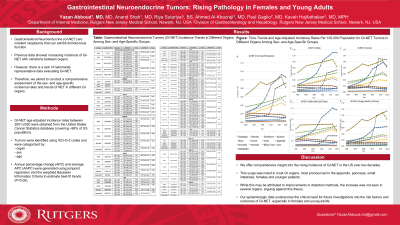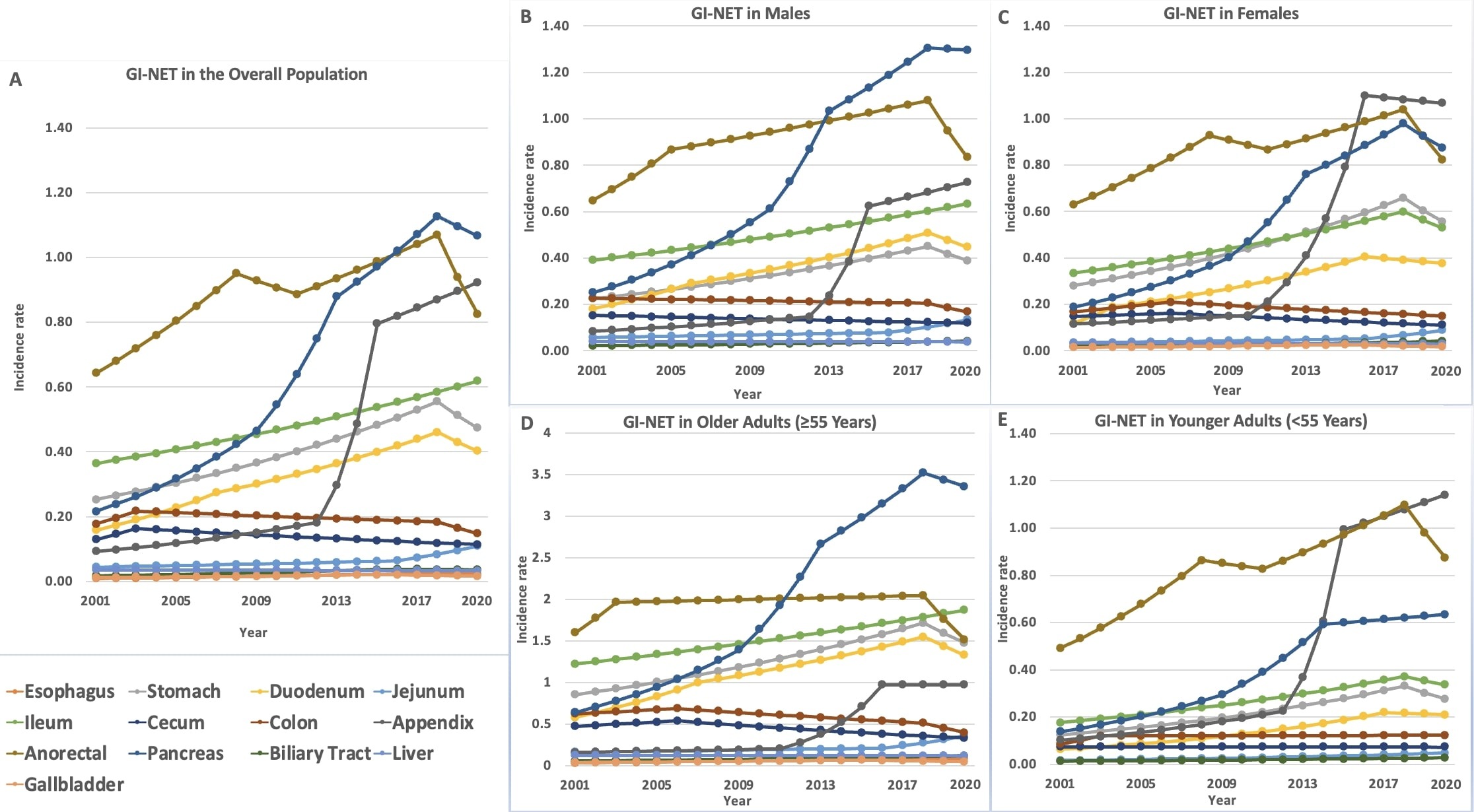Tuesday Poster Session
Category: Functional Bowel Disease
P4072 - Gastrointestinal Neuroendocrine Tumors: Rising Pathology in Females and Young Adults
Tuesday, October 29, 2024
10:30 AM - 4:00 PM ET
Location: Exhibit Hall E

Has Audio
.jpg)
Yazan Abboud, MD
Rutgers New Jersey Medical School
Newark, NJ
Presenting Author(s)
Yazan Abboud, MD1, Anand Shah, MD2, Riya Sutariya, BA3, Ahmed Al-Khazraji, MD1, Paul Gaglio, MD4, Kaveh Hajifathalian, MD1
1Rutgers New Jersey Medical School, Newark, NJ; 2Rutgers New Jersey Medical School, Harrison, NJ; 3New Jersey Medical School, Iselin, NJ; 4Rutgers NJ Medical School, Newark, NJ
Introduction: Gastrointestinal Neuroendocrine (GI-NET) are indolent neoplasms that can exhibit dichotomous function. Previous data showed increasing incidence of GI-NET with variations between organs. However, there is a lack of nationwide representative data evaluating GI-NET. Therefore, we aimed to conduct a comprehensive assessment of the sex- and age-specific incidence rates and trends of NET in different GI organs.
Methods: GI-NET age-adjusted incidence rates between 2001-2020 were obtained from the United States Cancer Statistics database (covering ~98% of US population). Tumors were identified using ICD-O-3 codes and were categorized by organ, sex, and age. Annual percentage change (APC) and average APC (AAPC) were generated using joinpoint regression and the weighted Bayesian Information Criteria to estimate best-fit trends (P< 0.05).
Results: There were 277,230 patients diagnosed with GI-NET between 2001-2020 with increasing overall incidence (AAPC=3.83). NET incidence was increasing in most GI organs, with the greatest increase in the appendix (AAPC=12.87), followed by pancreas (AAPC=8.75), duodenum (AAPC=5.02), jejunum (AAPC=4.86), esophagus (AAPC=4.66), biliary tract (AAPC=3.78), stomach (AAPC=3.36), ileum (AAPC=2.82), and lastly anorectal (AAPC=1.22). While stable trends were seen in the cecum, liver, and gallbladder, incidence was decreasing in the colon (AAPC=-0.95).
When stratified by sex, the incidence of GI-NET was increasing in males (137,179 patients) and females (140,051 patients) with variations between organs. Females experienced an overall greater increase (AAPC=3.82) compared to men (AAPC=3.56) and this was seen in most GI organs (Table).
When stratified by age, the incidence of GI-NET was increasing in older (181,221 patients) and younger adults (94,826 patients) with variations between organs. Younger adults experienced an overall greater increase (AAPC=5.23) compared to younger adults (AAPC=2.69) and this was seen in most GI organs (Figure).
Discussion: We offer comprehensive insight into the rising incidence of GI-NET in the US over two decades. This surge was noted in most GI organs, most pronounced in the appendix, pancreas, small intestines, females and younger patients. While this may be attributed to improvements in detection methods, the increase was not seen in several organs, arguing against this theory. Our epidemiologic data underscores the critical need for future investigations into the risk factors and outcomes of GI-NET, especially in females and young adults.

Note: The table for this abstract can be viewed in the ePoster Gallery section of the ACG 2024 ePoster Site or in The American Journal of Gastroenterology's abstract supplement issue, both of which will be available starting October 27, 2024.
Disclosures:
Yazan Abboud, MD1, Anand Shah, MD2, Riya Sutariya, BA3, Ahmed Al-Khazraji, MD1, Paul Gaglio, MD4, Kaveh Hajifathalian, MD1. P4072 - Gastrointestinal Neuroendocrine Tumors: Rising Pathology in Females and Young Adults, ACG 2024 Annual Scientific Meeting Abstracts. Philadelphia, PA: American College of Gastroenterology.
1Rutgers New Jersey Medical School, Newark, NJ; 2Rutgers New Jersey Medical School, Harrison, NJ; 3New Jersey Medical School, Iselin, NJ; 4Rutgers NJ Medical School, Newark, NJ
Introduction: Gastrointestinal Neuroendocrine (GI-NET) are indolent neoplasms that can exhibit dichotomous function. Previous data showed increasing incidence of GI-NET with variations between organs. However, there is a lack of nationwide representative data evaluating GI-NET. Therefore, we aimed to conduct a comprehensive assessment of the sex- and age-specific incidence rates and trends of NET in different GI organs.
Methods: GI-NET age-adjusted incidence rates between 2001-2020 were obtained from the United States Cancer Statistics database (covering ~98% of US population). Tumors were identified using ICD-O-3 codes and were categorized by organ, sex, and age. Annual percentage change (APC) and average APC (AAPC) were generated using joinpoint regression and the weighted Bayesian Information Criteria to estimate best-fit trends (P< 0.05).
Results: There were 277,230 patients diagnosed with GI-NET between 2001-2020 with increasing overall incidence (AAPC=3.83). NET incidence was increasing in most GI organs, with the greatest increase in the appendix (AAPC=12.87), followed by pancreas (AAPC=8.75), duodenum (AAPC=5.02), jejunum (AAPC=4.86), esophagus (AAPC=4.66), biliary tract (AAPC=3.78), stomach (AAPC=3.36), ileum (AAPC=2.82), and lastly anorectal (AAPC=1.22). While stable trends were seen in the cecum, liver, and gallbladder, incidence was decreasing in the colon (AAPC=-0.95).
When stratified by sex, the incidence of GI-NET was increasing in males (137,179 patients) and females (140,051 patients) with variations between organs. Females experienced an overall greater increase (AAPC=3.82) compared to men (AAPC=3.56) and this was seen in most GI organs (Table).
When stratified by age, the incidence of GI-NET was increasing in older (181,221 patients) and younger adults (94,826 patients) with variations between organs. Younger adults experienced an overall greater increase (AAPC=5.23) compared to younger adults (AAPC=2.69) and this was seen in most GI organs (Figure).
Discussion: We offer comprehensive insight into the rising incidence of GI-NET in the US over two decades. This surge was noted in most GI organs, most pronounced in the appendix, pancreas, small intestines, females and younger patients. While this may be attributed to improvements in detection methods, the increase was not seen in several organs, arguing against this theory. Our epidemiologic data underscores the critical need for future investigations into the risk factors and outcomes of GI-NET, especially in females and young adults.

Figure: Figure: Time-Trends and Age-Adjusted Incidence Rates Per 100,000 Population for Gastrointestinal Neuroendocrine (GI-NET) Tumors in Different Organs Among Sex- and Age-Specific Groups.
A: Time-Trends of GI-NET in overall US populations.
B: Time-trends of GI-NET in Males.
C: Time-trends of GI-NET in Females.
D: Time-trends of GI-NET in Older Adults Aged 55 years.
D: Time-trends of GI-NET in Younger Adults Aged < 55 years (15-54 years).
A: Time-Trends of GI-NET in overall US populations.
B: Time-trends of GI-NET in Males.
C: Time-trends of GI-NET in Females.
D: Time-trends of GI-NET in Older Adults Aged 55 years.
D: Time-trends of GI-NET in Younger Adults Aged < 55 years (15-54 years).
Note: The table for this abstract can be viewed in the ePoster Gallery section of the ACG 2024 ePoster Site or in The American Journal of Gastroenterology's abstract supplement issue, both of which will be available starting October 27, 2024.
Disclosures:
Yazan Abboud indicated no relevant financial relationships.
Anand Shah indicated no relevant financial relationships.
Riya Sutariya indicated no relevant financial relationships.
Ahmed Al-Khazraji indicated no relevant financial relationships.
Paul Gaglio indicated no relevant financial relationships.
Kaveh Hajifathalian indicated no relevant financial relationships.
Yazan Abboud, MD1, Anand Shah, MD2, Riya Sutariya, BA3, Ahmed Al-Khazraji, MD1, Paul Gaglio, MD4, Kaveh Hajifathalian, MD1. P4072 - Gastrointestinal Neuroendocrine Tumors: Rising Pathology in Females and Young Adults, ACG 2024 Annual Scientific Meeting Abstracts. Philadelphia, PA: American College of Gastroenterology.
